Howe's 801st NHL goal forgotten by many with Ovechkin closing in
Capitals star within 1 of tying Mr. Hockey for 2nd on all-time list
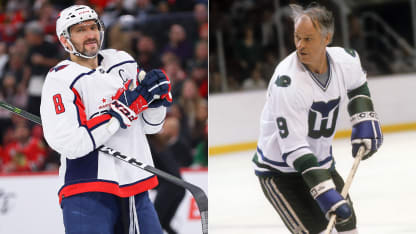
Howe was 52 years old when he scored his 801st and final NHL regular-season goal with the Hartford Whalers against the Detroit Red Wings on April 6, 1980. That stood as the NHL record until Wayne Gretzky scored his 802nd on March 23, 1994.
Ovechkin, who has 800 goals heading into the Washington Capitals' game against the Dallas Stars on Thursday (7 p.m. ET; NBCSWA, BSSW, ESPN+, SN NOW), is very familiar with Gretzky's achievements and will turn his attention to 894 -- The Great One's goal total when he retired in 1999 -- after he scores 802.
But Ovechkin, a native of Moscow, knew little about Howe before making his NHL debut with the Capitals at the start of the 2005-06 season.
RELATED: Alex Ovechkin joins 800-goal club]
"Obviously, he's Mr. Hockey, but when you're growing up, we didn't have Internet," the 37-year-old left wing said. "It was hard for us to understand how big of a name it is. But as soon as you came here, you just hear stories about Gordie Howe almost every day because he is legendary."
Many of the stories about Howe sound like the stuff of legend, from his age-defying longevity to his remarkable strength and ubiquitous elbows. Howe, who was 88 when he died June 10, 2016, played 26 seasons in the NHL: 25 with the Red Wings (1946-1971) and one with the Whalers (1979-80) following six seasons in the World Hockey Association (1973-1979).
But the tale of Howe's 801st goal -- the much-celebrated number Gretzky pursued and eclipsed, and the one Ovechkin is nearing -- has faded from the memories of almost everyone who played a role in it.
It would seem unforgettable that Howe scored his last regular-season goal against the Red Wings, the team with which he remains synonymous, in his last regular-season game. Yet neither Marty Howe nor Mark Howe, Gordie's sons and Whalers teammates, have any recollection of 801.
"I don't really," Marty said. "Mark would remember more than me."
"I really don't remember that," Mark said. "I don't remember that at all."
A grainy video confirms the
summary in the box score
: Gordie Howe scored his 15th goal of the season with assists from Ray Allison and Gordie Roberts at 11:25 of the second period of a 5-3 Whalers victory at Hartford Civic Center.
Gordie Howe's final regular season goal
Rogie Vachon, a 2016 Hockey Hall of Fame inductee, was in net for the Red Wings.
"I gave up his last goal?" Vachon asked. "I don't remember that."
Despite its significance, it's understandable some of the details of Howe's 801st goal have been forgotten in the 42 years since he scored it. But in some ways, the story around the goal and Howe's impact on those involved in it contributes more to his legacy than how he scored it.
"It's hard to describe because when I was a kid, he was the guy," Allison said. "But he was really the nicest guy and good to be around. He was just a really good guy and he just loved playing hockey."
\\*
In Mark Howe's defense, he didn't play in the game when his father scored his 801st goal because he was resting a sore knee. Mark returned to play in the Stanley Cup Playoffs and can accurately describe Gordie's goal in Game 2 of Hartford's preliminary-round series against the Montreal Canadiens on April 8, 1980.
There's a video on YouTube of that one, which completed the scoring in the Whalers' 8-4 loss at 13:59 of the third period and prompted a standing ovation from the Montreal Forum crowd.
"I've seen that goal a few times, but I remember," Mark said. "I picked the puck up and ran up the ice and fed him the puck and he made a little move and shot a backhander. I think the goalie got screened on it. So, the cool thing about it is I got the assist on the goal."
The Canadiens swept the best-of-5 series and, after Gordie announced his retirement June 4, 1980, that Game 2 goal became his last.
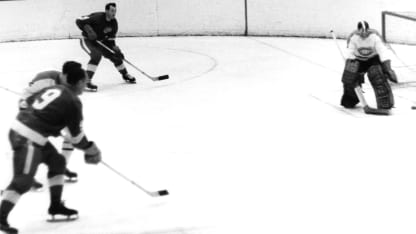
© B Bennett/Getty Images
Gordie Howe moves past Maurice "Rocket" Richard on the NHL all-time goal list when he beats Canadiens goalie Charlie Hodge for his 545th goal on Nov. 10, 1963.
But to Mark, "the most impressionable goal" his father scored was his 545th, which moved him ahead of Maurice "Rocket" Richard into first in NHL history. An 8-year-old Mark was at Detroit's Olympia Stadium to see Gordie score against Montreal goalie Charley Hodge in a 3-0 victory.
"Of the things my mom collected and kept of Dad's memorabilia and everything -- and we have been selling a bunch of stuff off to raise money for their charity -- we're always going to keep some things together," Mark said. "And at the very top of the list are anything that has to do with No. 545."
Gordie increased his goal total to 786, (which remained the NHL record for most with one team until Ovechkin scored his 787th with the Capitals on Nov. 5) before he retired for the first time following the 1970-71 season because of a chronic wrist injury. A four-time Stanley Cup champion and six-time winner of both the Hart Trophy as the NHL's most valuable player and Art Ross Trophy as the League leader in points, he was inducted into the Hockey Hall of Fame in 1972, and the Red Wings retired his iconic No. 9.
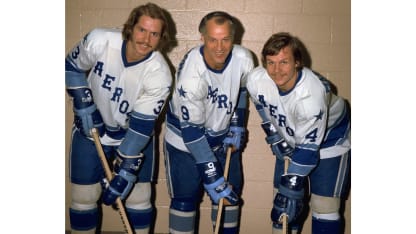
After his first retirement from the NHL, Gordie Howe played with sons Marty, l., and Mark, r., with the Houston Aeros of the WHA. This photo from the 1973-74 season.
But Gordie found retirement, and his ensuing job as Detroit's vice president, unsatisfying. So when the offer came to play with Mark and Marty with the Houston Aeros in WHA in 1973, he had wrist surgery and returned to the ice at 44.
"He hadn't skated in two years when he came into camp and he was turning all different kinds of purple," said Marty, a defenseman who played six seasons in the WHA and six more in the NHL before retiring in 1985. "He couldn't make a pass. His shots were horrible. Then, after about 2 1/2, three weeks, all the sudden, he just got his wind.
"His passes were crisp. They were on the tape. He was knocking people over. You couldn't take the puck away from him."
With Mark as a linemate, Gordie led the Aeros with 100 points (31 goals, 69 assists) in 70 games and was voted the WHA MVP in 1973-74. He had 17 more points (three goals, 14 assists) in 13 playoff games to help Houston win the first of consecutive league championships.
"It was flat-out scary how good he was," said Mark, a 2011 Hockey Hall of Fame inductee who played six WHA seasons and 16 NHL seasons before retiring in 1995. "He was better at 46 than I ever was in any year of my career."
\\*
Free agents following the 1976-77 season, the Howes talked briefly with the Red Wings and Boston Bruins, who selected Mark in the second round (No. 25) of the 1974 NHL Draft, but neither team wanted all three. So, father and sons signed with the WHA's New England Whalers.
"Boston had the best deal for Mark, but if we went to Boston, they didn't have anything for Gordie," Marty said. "In New England, the contract was for the same amount of money, only for 10 years instead of five. But he wanted to play, and we wanted him to play."
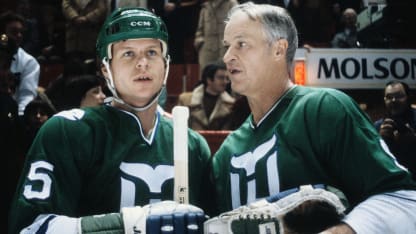
© Denis Brodeur/Getty Images
Gordie Howe and his son, Mark, during their days with the Hartford Whalers.
After two seasons with New England, the 1979 merger with the WHA brought a 51-year-old Gordie back to the NHL with the renamed Hartford Whalers. But dizzy spells that prevented him from playing during the 1979 preseason threatened to end his NHL return before it began.
"He was having some issues and I don't know whether it was vertigo or whatever it was, and they were trying to get him to retire," said Chuck Kaiton, the Whalers/Carolina Hurricanes radio play-by-play voice for 39 seasons. "I know Jack Kelley, the general manager, was saying, 'He's not 100 percent.'
"In fact, that was my first broadcast. We played a preseason game against Pittsburgh at Springfield Civic Center and Gordie was my color man because he didn't play in the game. He was really [ticked] off, I think, because that was happening."
Howe received medical clearance before the regular-season opener, however, and did not miss a game that season.
"If you saw his body, he was so beat up," Mark said. "But whether it was dizzy spells, and I know he had broken foot for a while, his wrists were bad for all those years and all the other various things, nothing was stopping him."
Gordie started the season strong, scoring eight goals in the first 14 games and 11 in first 25. But coach Don Blackburn reduced Gordie's ice time as the season progressed, and he played mostly on the fourth line with enforcer Nick Fotiu and a few other forwards, including Allison.
"It was unbelievable," Fotiu said. "A kid from Staten Island, New York. 'What do I get to do today? Play with Gordie Howe.'"
Even with limited ice time, Gordie finished the season with 41 points (15 goals, 26 assists) in 80 games.
"And that's probably not playing many power-play minutes," Allison said. "But he could still score. It's rare when you find that athletic ability that holds up that long. He was so efficient when he skated that it just seemed effortless."
The Whalers' inaugural NHL roster also included Hockey Hall of Fame inductees Dave Keon (1986) and Bobby Hull (1983), who was acquired in a trade with the Winnipeg Jets on Feb. 27, 1980. Gordie scored his 800th NHL goal in Hull's Whalers debut, a 3-0 victory against the St. Louis Blues two days later.
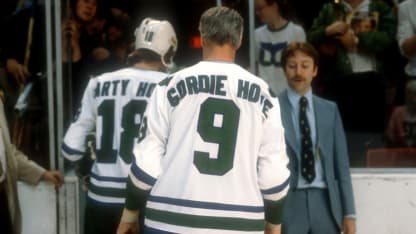
© Bruce Bennett/Getty Images
Gordie was already a Hall of Famer, but inside the locker room, he was like everyone else.
"Gordie was just a very down-to-earth guy that wanted to fit in with everybody, and he took a lot of kidding and had a great nature about all that and being able to give it back," Roberts said. "Obviously, he was a veteran of the dressing room humor in addition to everything on the ice."
Mark played wing on Gordie's line in the WHA but was moved to defenseman four games into that season and thrived there over the rest of his career. Marty spent most of 1979-80 in the American Hockey League with Springfield and missed a chunk of time with a broken arm before being called up and playing in six games with Hartford in the final month of the regular season.
Marty's second NHL game was in Detroit on March 12, 1980. Although Marty was a defenseman, Blackburn put him at left wing on an all-Howe starting line with Gordie at center and Mark, who moved back up from defense, on the right.
"The funny thing about the story is they told Marty, 'You'll start the game, but as soon as they drop the puck, get off the ice,'" Mark said. "And Dad was sitting there and as soon as the coach walked away, Dad said, '[Forget] that, Marty. You're going to play a whole shift with me.' So Marty stayed out and played the whole shift."
Whether the Whalers played in Detroit, where the Howes remain hockey royalty, or any of the other 19 NHL cities they visited that season, Gordie was usually the center of attention and greeted warmly by fans.
"It didn't really matter if we won or lost," said Jim Warner, a forward who played 32 games for the Whalers in 1979-80. "[The media] didn't want to talk to anybody [else]. It didn't matter if you scored a hat trick in the game. They wanted to talk to Gordie Howe, and Gordie was very gracious.
"But it was a celebration really for all of us and a privilege to be able to play with him."
\\\
Entering the Whalers' regular-season finale, Gordie hadn't scored in 18 games. Perhaps he was saving his last regular-season goal for the Red Wings.
"I suppose for writing purposes," Marty said, laughing. "You never know. It would've been nice if he had gotten a hat trick."
Gordie settled for two points, picking up his final NHL assist on Allison's goal that opened the scoring in the first period and scoring to give the Whalers a 3-2 lead in the second.
The sequence that led to his 801st goal began with Fotiu carrying the puck into the Detroit zone on the right wing and into the corner before sending a backhand pass through the slot that ended up on Roberts' stick at the left point.
Fotiu spent that season soaking in everything he could from Howe, who would show up two hours before practice to tutor him.
"It was just me and Gordie on the ice and him teaching me," Fotiu said. "It was unbelievable. To me, he's one of the greatest players ever and he took the time to teach me. Actually, that was my best year, playing with Gordie."
Fotiu, who played 13 seasons in the League (1976-1988), scored an NHL career-high 10 goals in 1979-80. He doesn't remember anything about Howe's 801st goal, though.
"I just remember the playoff goal that I was on the ice for," Fotiu said.
Ask Roberts about his role in 801, and after giving a tongue-in-cheek answer about making an end-to-end rush to set up Howe for a tap-in, he acknowledges, "I don't even know if I had the first or second assist on the goal.
"But I did see it in a Trivial Pursuit game one time. That's when it kind of registered that, 'Holy crim. I had an assist on Gordie's last goal.'"
The youngest of four hockey-playing brothers who grew up in Detroit, Roberts was linked to Howe from his birth in 1957, thanks to his oldest brother, Jack, a stick boy in the visiting locker room at the Olympia and a Howe admirer.
"My mom wanted to name me Clifford," said Roberts, a defenseman who played 15 seasons in the NHL (1979-1994) and won the Stanley Cup with the Pittsburgh Penguins in 1991 and 1992. "[Jack], who is 19 years older than me and played at Michigan State, talked her into naming me Gordie. So, that was pretty interesting 20-something years later."
\\\
Roberts took two slap shots from the left point before Howe scored. The first one went wide left and caromed off the end boards to Howe to the right of the net.
Howe spun in the circle and tried to feed Allison in the slot, but the pass didn't connect, and the puck carried back to Roberts. While Roberts wound up for his second shot, Red Wings defenseman Reed Larson battled for position with Fotiu in front of the net.
"I remember playing against Gordie when he was on the Whalers," Larson said. "But that last goal, I was in that game? That's funny."
Digging deeper into his memory, Larson vaguely recalled Howe scoring against Detroit in Hartford.
"I can't describe it, but I remember they made a pretty big deal about it," Larson said.
That was not the loudest or longest ovation Larson witnessed for Howe that season, though.
As the host Red Wings' lone representative in the 1980 NHL All-Star Game at Joe Louis Arena, Larson was the penultimate player to take the ice during the pregame introductions.
"As I get off the bench and skate out to the middle of the ice, the crowd is on their feet going nuts," Larson said. "They're just going nuts and I'm like, 'This can't be for me.'"
After Larson took his place on the blue line, the cheering grew louder, and he looked back to confirm his suspicion. Howe, who was selected by Wales Conference coach Scotty Bowman as Hartford's representative, was on the bench waiting be introduced.
"I didn't know he was out of the tunnel, yet," Larson said. "It went on for what seemed like an hour, but 10-15 minutes. It just didn't stop; it was pretty cool. That's the biggest, longest lasting standing ovation I've ever seen or been a part of."
Larson, who played 10 of his 14 NHL seasons (1977-1990) with Detroit, wasn't afraid to mix it up in front of the net with Fotiu, who racked up 1,362 penalty minutes in his NHL career. But he was smart enough to keep his distance from Howe, even with Mr. Hockey at 52.
"When you'd go into the corner, you'd kind of just put your hands gently maybe around him," Larson said, laughing. "It's funny. He didn't bother anybody, and nobody bothered him. … He had that old-man strength. You didn't want to test him."
So Larson remained with Fotiu in front after Vachon steered Roberts' second slap shot with his blocker toward the left corner. Allison raced after it with Red Wings forward Bill Hogaboam in pursuit.
\\\
That Allison played a pivotal part in Howe's 801st goal was news to him. He was also unaware Howe set him up for a goal in the first period of that game.
"Now, I know what I didn't know before," Allison said.
The No. 18 pick in the 1979 NHL Draft, Allison was Hartford's top prospect after he had 153 points (60 goals, 93 assists) in 62 games the previous season with Brandon in the Western Hockey League. So when the 19-year-old arrived for his first NHL training camp, the Whalers put him in a room with Mr. Hockey.
"He lived in Hartford, so he only stayed at the hotel for one night," Allison said. "But this was the first night I was in town and my roommate was Gordie Howe."
Allison approached that evening like he did much of his rookie season and followed Howe's lead.
"He was watching TV, so we watched TV," Allison said. "We did whatever he wanted us to. When the lights went out, the lights went out. I was too young not to be agreeable."
Allison played 13 AHL games for Springfield but spent most of the season with Hartford and had 28 points (16 goals, 12 assists) in 64 games. Like with Fotiu, Howe mentored Allison, enthusiastically sharing his extensive hockey knowledge, such as the benefit from coming from behind the puck carrier on the rush.
"He taught me more about hockey than I knew," said Allison, whose NHL career was limited to seven seasons (1979-1987) because of injuries. "If I was patient enough to wait while he had the puck in the neutral zone until the defenseman went at him and then go, he'd get me the puck. It's something that I didn't think of.
"I always thought I had to go ahead to get the puck. He said, 'No, I'll see you coming from behind. Come from behind.' He taught me that kind of stuff."
Allison learned another lesson the hard way.
"One time in practice, I reached around him to poke the puck and, you know the elbow stories? Well, they're true," Allison said. "The lights briefly went out. And he does it so funny because he had a big smile on his face. He just looked at me like, 'Are you stupid?'"
\\\
After Allison reached the puck in the left corner, he deftly backhanded it behind the net and a lurking Howe swept in from the right wing to collect it. Credit Kaiton for being able to recall at least some of what Howe did next.
"Yeah, I remember the goal," Kaiton said. "He came around the net and he backhanded it on the short side of Vachon."
Kaiton was correct that Howe circled out from behind the net with the puck and scored, but the puck was on his forehand. Larson was still tied up with Fotiu in front, and when Vachon reached outside the near post with his stick, Howe slid the puck around him and inside the far post.
Now 77, Vachon doesn't remember any of that.
"It's been so long," he said.
Yet, Howe scoring his final regular-season goal against Vachon was a fitting bookend to their on-ice relationship. Vachon stopped Howe for his first NHL save when he made his League debut against the Red Wings as a 21-year-old Canadiens rookie Feb. 18, 1967.
"That, I do remember vividly," Vachon said. "He had a breakaway from the blue line in and it was the first shot of my whole career, and I was lucky. I stopped it. Looking back, it probably kept me in the League for 16 years."
Howe would score later in the first period, but Vachon's confidence was boosted by the first of his 41 saves in a 3-2 victory.
"It makes a big difference," Vachon said. "If he scores on the first shot, who knows? I could've panicked. You never know."
\\*
Howe's 801st goal came on his last regular-season shot. After the puck went in, he raised his stick in celebration and was mobbed by his teammates on the ice. He received a standing ovation from the Civic Center crowd as he skated to the Whalers bench.
Though no one knew for certain in that moment that it would be his final regular-season goal, he had turned 52 a week earlier and the writing was on the wall that it would be his last NHL season.
"I didn't know it, but I sensed it," Kaiton said. "It was just a phenomenal feat for him to play at 52. … I figured it would be his last year because they had already promised him a front-office job too."
Howe's sons believe their father wanted to play, but the Whalers weren't interested.
"I only saw him cry twice," Mark said. "One was when his mother died and the other was when he kind of got forced into retirement."
Still, the 1979-80 season was a worthy epilogue to Gordie Howe's unmatched NHL career, which he finished with 801 goals, 1,049 assists and 1,850 points in 1,767 games -- all League records at the time.
"It was pretty special on that end," Roberts said. "To go out with that one year in the NHL, to go around to the Original Six teams that he used to battle all the time, going into Detroit and then the All-Star Game he had in Detroit and things like that, you couldn't have written a better script for the whole season."
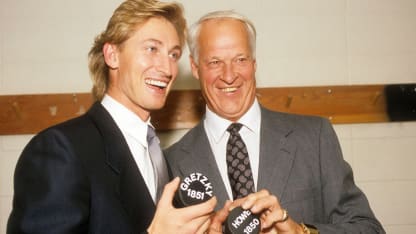
© B Bennett/Getty Images
Gretzky now sits atop the NHL record book in goals, assists (1,963) and points (2,857). Longtime San Jose Sharks forward Patrick Marleau broke Howe's games record last season before retiring with 1,779 over 23 seasons.
Howe is 10th in assists, fourth in points and, for at least a little while longer, second in goals. When Ovechkin scores his 802nd, Howe's 801st might fade further, but his legacy will not.
"He shows love to the game," Ovechkin said. "He shows how good you can be. It doesn't matter how old you are. He played until 52. It's unbelievable. That's why they call him Mr. Hockey because he loves the game so much."
Photos: Hockey Hall of Fame, Getty Images

















